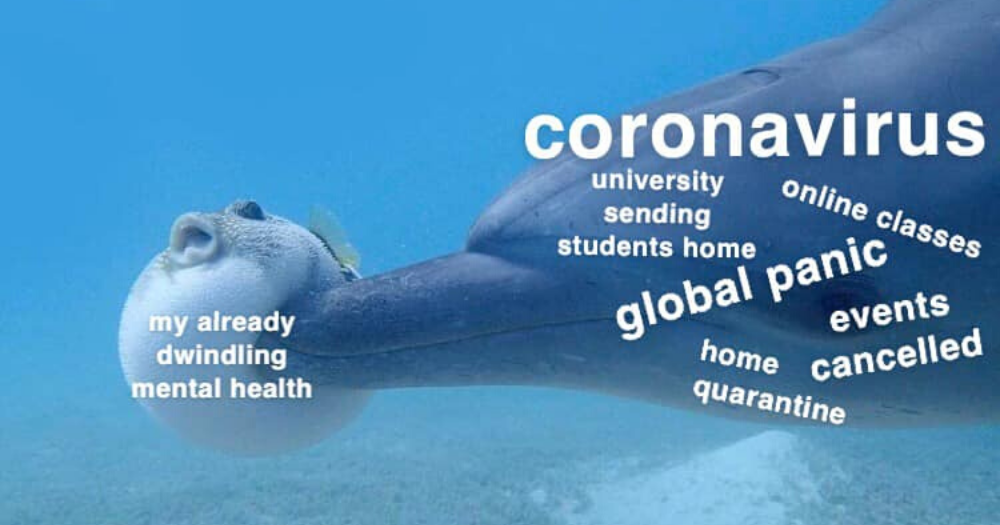And as we push through this second month of being stuck at home, I have to admit that I’ve spent probably too much time "coping" with the global pandemic by scrolling through memes on Facebook, some of which are too real:
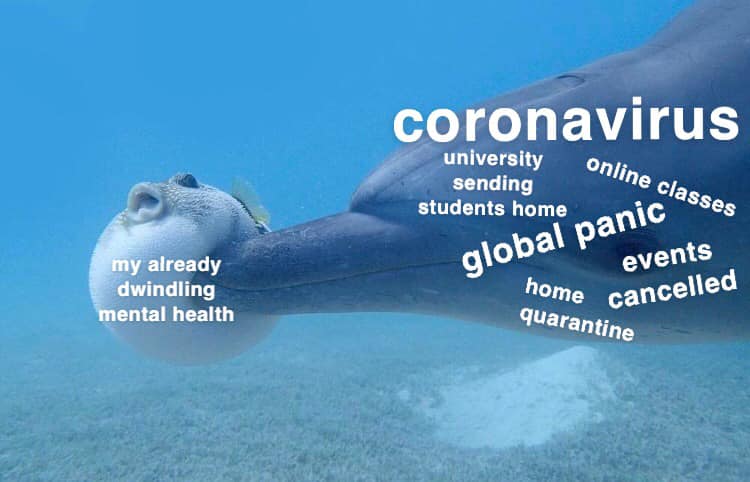 Image via Facebook / Zoom Memes for Quarantined Teens.
Image via Facebook / Zoom Memes for Quarantined Teens.
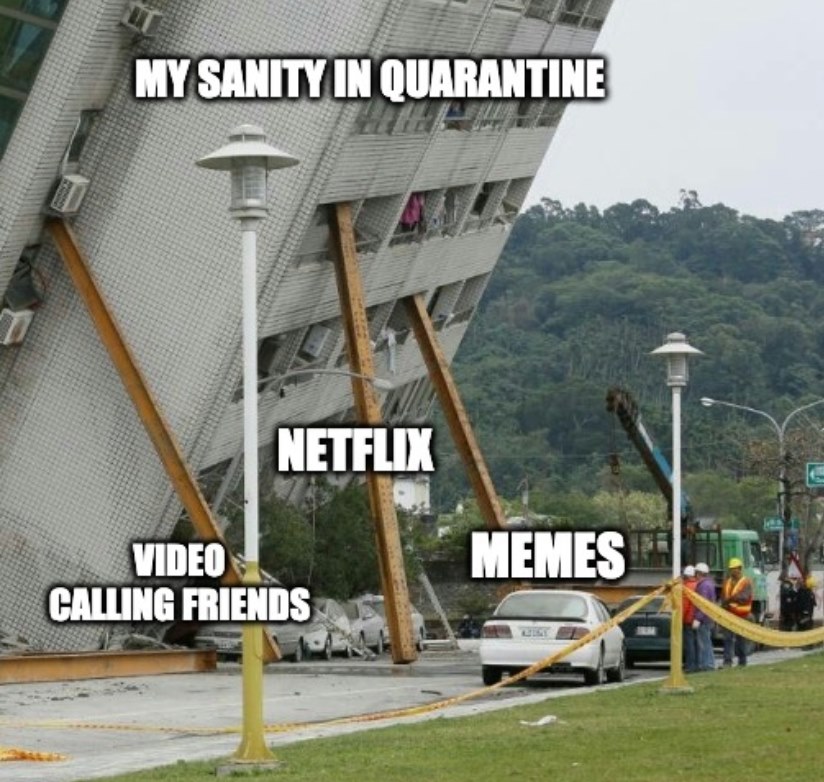 Image via Facebook / Zoom Memes for Quarantined Teens.
Image via Facebook / Zoom Memes for Quarantined Teens.
Jokes and memes aside, though, the Covid-19 crisis, along with the circuit breaker measures, have truly taken a real hit on many people’s mental health.
Minister for Social and Family Development Desmond Lee wrote in a Facebook post on Apr. 29 that in the first two weeks after the launch of the National CARE Hotline, more than 6,600 people had called seeking support.
The United Nations even declared on May 13 that mental health services are an "essential part" to all governments' responses to the pandemic, saying that "the Covid-19 virus is not only attacking our physical health; it is also increasing psychological suffering".
And I must admit I, too, find myself waking up many mornings with my chest heavy with anxiety the moment my eyes open.
Simple tasks like feeding myself by either cooking a meal or leaving the house to dabao food back can on occasion feel like too much to handle.
And there are days where I find myself stuck between feeling frustrated and helpless about the situation around me, while simultaneously knowing I should recognise how lucky I am to be healthy and have a stable job and roof over my head during this time when many are not so privileged.
And while different people deal with such situations in their own ways, perhaps you feel a similar way — with a lingering feeling of discomfort, despair, confusion, fear or indifference (or an amalgamation of them all), for which, if you happen to be a millennial like me, you might use memes as a coping mechanism.
Accordingly, these are challenges it seems several experts in the mental health industry are hearing from more and more, from a rising number of people approaching them for help in this period.
These, I've found, have given them valuable insights into the impact of Covid-19 on our mental health, why we might be feeling the way we are, and how we can navigate our way through this crisis.
Adrian Toh and Jaswyn Chin are both senior psychologists in the department of psychology at Tan Tock Seng Hospital (TTSH), while Vinti Mittal is a registered counsellor and director at SACAC Counselling.
 Left to right: Vinti Mittal, Adrian Toh, and Jaswyn Chin.
Left to right: Vinti Mittal, Adrian Toh, and Jaswyn Chin.
And the first thing they want us to know is...
1. You're not alone in how you feel
"While we may feel lonely and isolated during the circuit breaker period, the truth is that we are actually not alone. There are many others who share our feelings," said Chin.
Chin explains that there have been many more patients coming into their sessions at TTSH during this period wanting to discuss a number of concerns having to do with the outbreak.
Mittal shares that over at SACAC Counselling, they too have seen more clients since the last week of January this year, and while the exact figures are difficult to disclose, the number of clients have "increased considerably" as compared to the same time period last year.
Stress, fear, anxiety and depression are common concerns
Mittal adds that the issues current patients seek support for are "more severe and intense", and that many clients "display urgency in seeing a therapist", requesting sessions on the same day or the next day.
Here are some of the concerns people have been dealing with:
- Fear of infection from Covid-19
- Financial difficulties due to reduced earnings or loss of employment
- Work-life balance
- Adjustment issues such as from the loss of a regular routine, reduced social activities
- Stress brought about by caregiving and parenting
- Interpersonal relationship issues and family conflicts
- Anxiety, depression, and self-harm
Pandemic can exacerbate mental health issues
These challenges are even more difficult for people who already deal with mental health issues prior to the outbreak.
And the longer the quarantine, Mittal explains, the worse the impact will be on a person's psychological well-being:
"Research says that people do much better in the first part of the pandemic than the [latter] — In the initial part, people conserve their emotional reserve, and actively engage in coping, hence they do well.
In the second half, there is uncertainty when this will all get over and hence depletion of the emotional reserve starts happening, leading them to feel let down."
She shares that some of the mental health and psychological issues that can be exacerbated by times like this include post-traumatic stress symptoms , confusion , irritability , stress, anxiety, fear, tiredness, and anger.
And so, given that so many of us are facing difficulties as we go through this time, it's important to remember that...
2. It’s okay not to feel okay
In these difficult and uncertain times, it's important to remember that feeling the way you are feeling is valid, says Chin:
"The instabilities and uncertainties of the future, and having to react and adjust quickly to the changes can be anxiety-provoking.
Very often, our concerns are valid and we find ourselves having to worry or plan more.
Whether we are trying to break out of our old habits or develop new habits, the process can be both frustrating and depressing. These emotional disturbances or distress that we feel are actually pretty normal."
Avoid being overly-critical of yourself
These emotional disturbances that we deal with can definitely impact our everyday life, with many people experiencing lowered mood, increased frustration and anxiety, poorer sleep or appetite, and feelings of loneliness and emptiness, explains Chin.
This is particularly true during the circuit breaker period, when we may feel a reduced sense of freedom and privileges, and during which our ability to practice coping strategies we previously developed to deal with issues like stress (like going to the gym or meeting friends outside) may be reduced because of restrictions and safe distancing measures.
So, Chin says, it's important to be kind to ourselves in this time:
"Be kinder and more compassionate towards yourself during this challenging period. Avoid being overly-critical that you are not performing at your optimum level."
And one way to practice this kindness to yourself and help cope during this time is to...
3. Spend some time being mindful of yourself and your surroundings
Toh suggests practicing mindfulness — being aware of your emotions, thoughts, and physical sensations, as well as of things and people around you, such as the situation, people, and the environment.
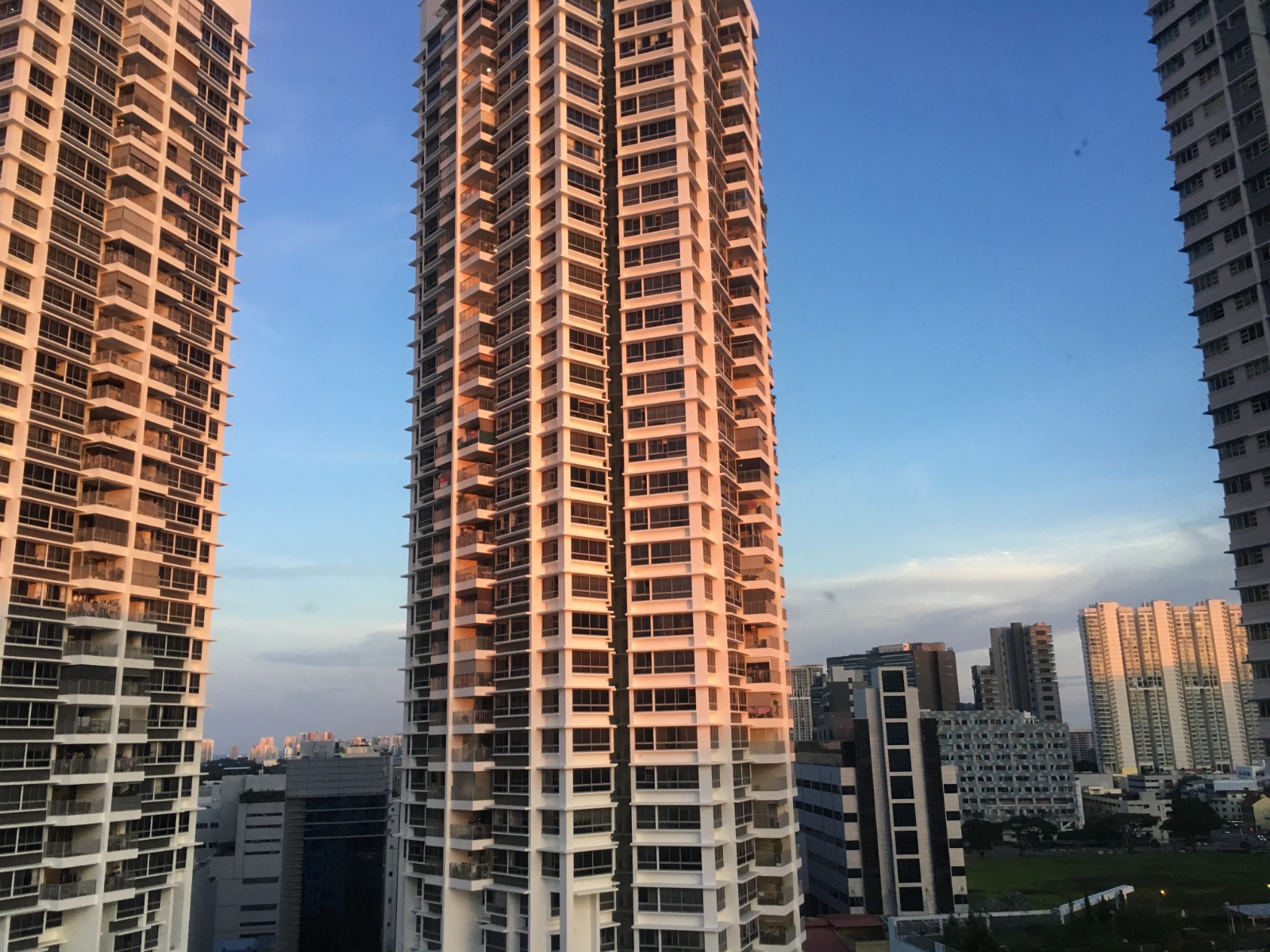 I've been trying to appreciate the sky more, even if I can't go outside. Photo by author.
I've been trying to appreciate the sky more, even if I can't go outside. Photo by author.
He shares that mindfulness exercises can help increase the awareness of being in the moment, and that research has highlighted a multitude of benefits from it.
These include having reduced impulsivity, improved emotional regulation, and wiser decision-making, all of which are helpful during this time.
"In a pandemic as such, changes and uncertainties are constants," says Toh.
Here's how Toh says you can try to cope with these uncertainties:
"Consider what you value at this moment (e.g., family relationship), and some small goals that you can work on for this week (e.g., playing a board game with family on Thursday evening) that are within your control."
Focus on what you can control
All three mental health professionals encourage focusing on the idea of control, and on what is in our control.
"Consider what is within control and what is not," says Toh. "For things that are not within your control, consider making space for them, with willingness."
Chin gives the reminder to take it slow.
"Be mindful and focus on things that are within our control or ability to change. We need to learn to take one step at a time during times of uncertainties."
For example, she says, rather than worrying about whether we will be infected with Covid-19, we can focus on how we can keep ourselves safe, such as by wearing masks, practising good hand hygiene, and practising social distancing.
Chin also suggests keeping track of your mood and worries:
"We often feel impatient about 'fixing the problems' to relieve us of our worries. Unfortunately, not everything can be resolved immediately.
Constant worrying and ruminating about a problem that is not within our control will likely stress us more. Therefore, try giving our minds a breather by distracting it through engaging in pleasant activities."
Pleasant activities like listening to the radio, reading, cooking, baking or even doing embroidery can reduce one's sense of boredom, says Chin.
 My attempt at spaghetti carbonara. Tasted better than it looks. Photo by author.
My attempt at spaghetti carbonara. Tasted better than it looks. Photo by author.
 It's been nice waking up earlier some days to make myself breakfast as well! Photo by author.
It's been nice waking up earlier some days to make myself breakfast as well! Photo by author.
Consciously choosing to engage in such activities is another form of control — controlling how you spend your time, says Mittal.
In order to "keep our minds from negative thoughts", Mittal also recommends limiting exposure to social media, technology, and negative news from the media.
In particular, fake news can create a sense of despair and panic, subjecting us to unnecessary stress, worries or fears, adds Chin.
She emphasises the importance of making sure our facts are correct, keeping a critical outlook to distinguish between real and fake news, and verifying information from reliable sources.
4. Reach out for social support and interaction
The circuit breaker period can be a challenging period also because as mentioned earlier, many of the normal ways we cope with tough situations (that involve leaving the house or meeting up with people not living with us) are now not necessarily available.
Chin explains:
"Being meaningfully engaged in social activities outside of home is often a very important stress-coping strategy for many.
Not being able to carry out these coping strategies due to having to stay home can also mean greater tendency to avoid or suppress negative emotions which can become detrimental in the long run."
And the feeling of social isolation can be really tough, adds Mittal:
"Isolation has been distressing for people, especially after the extension. Living in isolation and confinement for extended periods of time is a psychological challenge."
She notes that isolation can be devastating to people because they end up stuck in their own thoughts and fears, and adds that it's particularly tough for people and families for whom one of the members is already struggling with mental health issues.
This is why Toh works with individuals to explore non-conventional ways to connect with their support networks, such as through video calls, playing group games online, or even ordering food for one another and enjoying food together through video calls.
 Calling my brother always involves lots of fun filters. Photo by author.
Calling my brother always involves lots of fun filters. Photo by author.
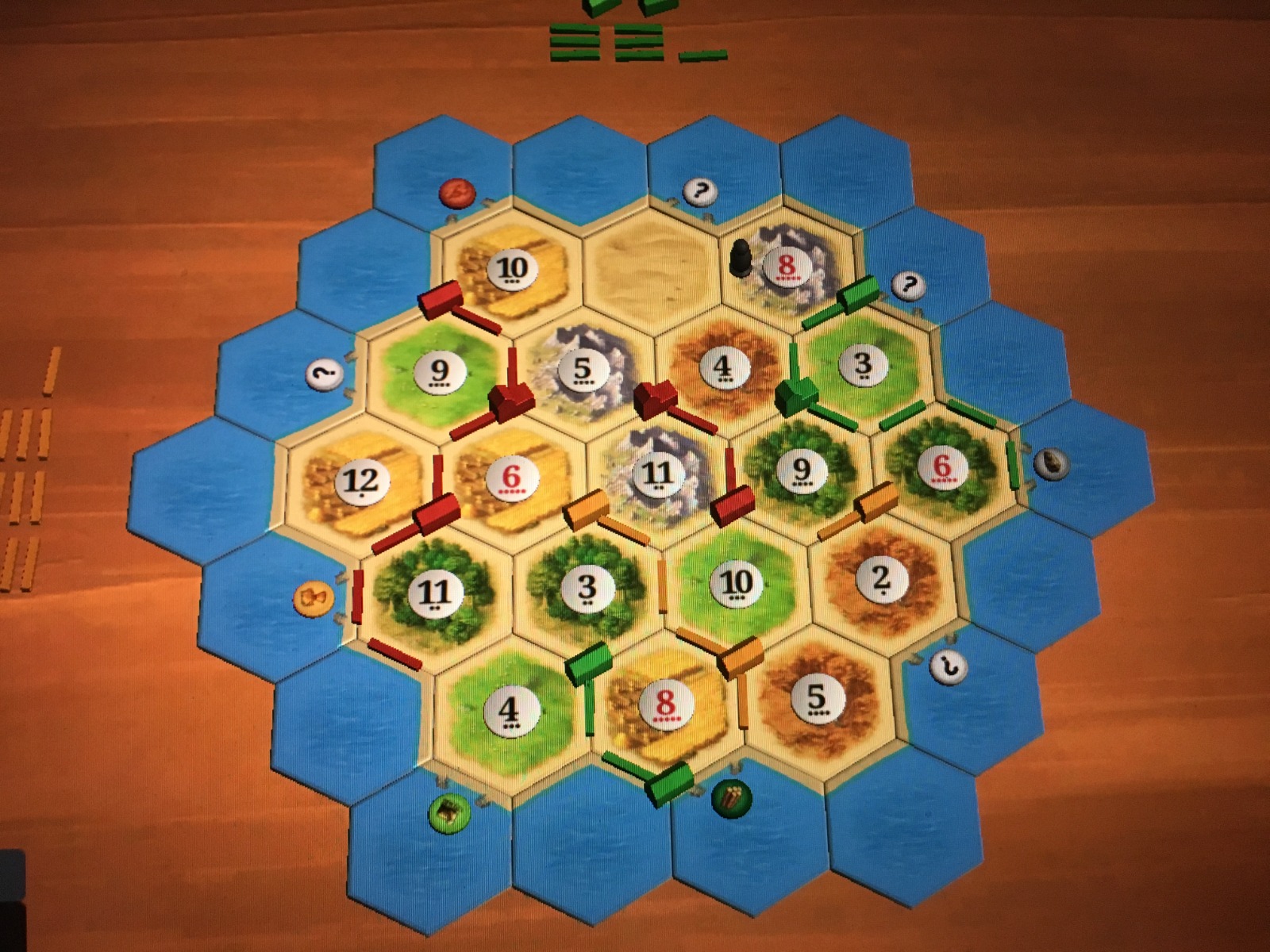 Online Settlers of Catan feels just as competitive as playing in person. Photo by author.
Online Settlers of Catan feels just as competitive as playing in person. Photo by author.
"Being creative and flexible can improve their mental ability to adapt when the situation changes," he adds.
And when it comes to reaching out to friends and family for support, it's important that we're also checking in on how they're doing.
Reach out to vulnerable groups
Certain groups of people are particularly impacted by the current situation, including children, healthcare workers, and Covid-19 patients.
Children "may experience and express stress differently, and are likely ignored or misinterpreted", Toh says.
And research has shown that healthcare workers, in addition to the general public, can develop post-traumatic stress disorder (PTSD) as the pandemic prolongs.
He explains that while symptoms tend to naturally recover over time for most people, some don’t, and that if you or someone you know is experiencing PTSD symptoms, you should speak to a mental health professional.
Similarly, Covid-19 patients should not be overlooked, Toh adds.
"While it was unfortunate that these individuals were infected with the virus, the unfortunate may not end when the individuals are discharged from medical care.
It is followed by waves of psychological, social and emotional issues, such as trauma, stigma and feelings of separateness which may last long after the pandemic ends."
Stigma, Toh explains, could take the form of being intentional, as a casual joke, or labelling the person and tying their identity to the virus.
"We are in the same storm, but not in the same boat. While we continue to manage our own emotions and thoughts, let us pause and take moments to demonstrate kindness and compassion to the individuals who were infected with the Covid-19," he says.
5. Manage the struggles of working from home
For those of you who, like me, are lucky enough to be able to work from home, you may be trying to figure out if this is a blessing or a curse.
In some ways, the flexibility of working from the comfort of your own bed or kitchen table and the ability to roll out of bed five minutes before work starts sounds great.
In reality, however, working from home can be tough, and can have an impact on your mental health and well-being as well.
Toh points out that not everyone is familiar with such work arrangements and that research has shown several disadvantages, such as the lack of social connection, decreased self-esteem, and loneliness.
He adds that working from home can result in overworking and burnout, which, as someone who had to break the bad habit of reaching for my laptop as soon as I woke up in the morning and working late because I didn't have anywhere else to be, definitely resonated with me.
Useful tips for working from home
Some strategies from Toh to consider when working from home include:
- Setting specific work goals for the particular day or week
- Rewarding yourself (for example with a short break) when you reach certain milestones through the day
- Being accountable to someone else about goals and plans, which can also keep you connected socially
- Having clear work boundaries — this includes both work hours as well as physical boundaries (i.e., working in a designated place at home)
- Having clear and open communication with colleagues or superiors regarding expectations
6. Seek mental health support
In addition to the above tips, it's important to remember that seeking support from mental health professionals might be necessary during this time, and is nothing to be ashamed of.
It's very important to destigmatise mental health issues, and to seek help if you need it.
Here are some resources you can utilise to secure mental health support:
The Singapore Psychological Society and the Singapore Association for Counselling have a list of registered psychologists and counsellors that people can seek help from.
The Singapore Psychological Society has also compiled a list of services specifically for the Covid-19 situation, including a number of counselling services that are available either pro bono or at reduced rates.
The 24-hour hotline National Care Hotline offers psychological and emotional support for anyone in need at 6202 6868.
Gov.sg also has listed a number of helplines available for emotional or psychological support, covering issues such as mental well-being, marital and parenting issues, violence and abuse, and counselling.
Some positive takeaways
While dealing with a global pandemic (and its accompanying ramifications) can be difficult, Mittal lays out some positive aspects that we can be thankful for:
- Parents and children getting more time to understand each other more.
- Education boards investing in developing e-learning platforms to offer an increasing number of online courses , which will allow education to reach wider populations, including those in remote areas around the world.
- The revamping of healthcare systems in different countries.
- Businesses rethinking having employees come to the office every day.
- The Earth getting a break from centuries of overuse — this has left a positive impact on the environment.
- Building resilience.
- People developing more gratefulness for different things, people, environment, and opportunities in life.
Reminding ourselves of some of the positives does not invalidate the difficulties we may be facing or the struggles we may be dealing with.
Instead, it allows us to practice gratitude and see specks of light during tough times, while also recognising that the difficulties we continue to face are present and valid.
And as Chin says:
"It is important to remember that we are not alone in dealing with this pandemic. Be respectful of how each and every one of us reacts or deal with stress. What works for some may not always work for you.
Believe in yourself and be optimistic that you will be able to overcome the current difficult period eventually."
Mothership Explains is a series where we dig deep into the important, interesting, and confusing going-ons in our world and try to, well, explain them.
This series aims to provide in-depth, easy-to-understand explanations to keep our readers up to date on not just what is going on in the world, but also the "why's".
Image via Facebook / Zoom Memes for Quarantined Teens.
If you like what you read, follow us on Facebook, Instagram, Twitter and Telegram to get the latest updates.
